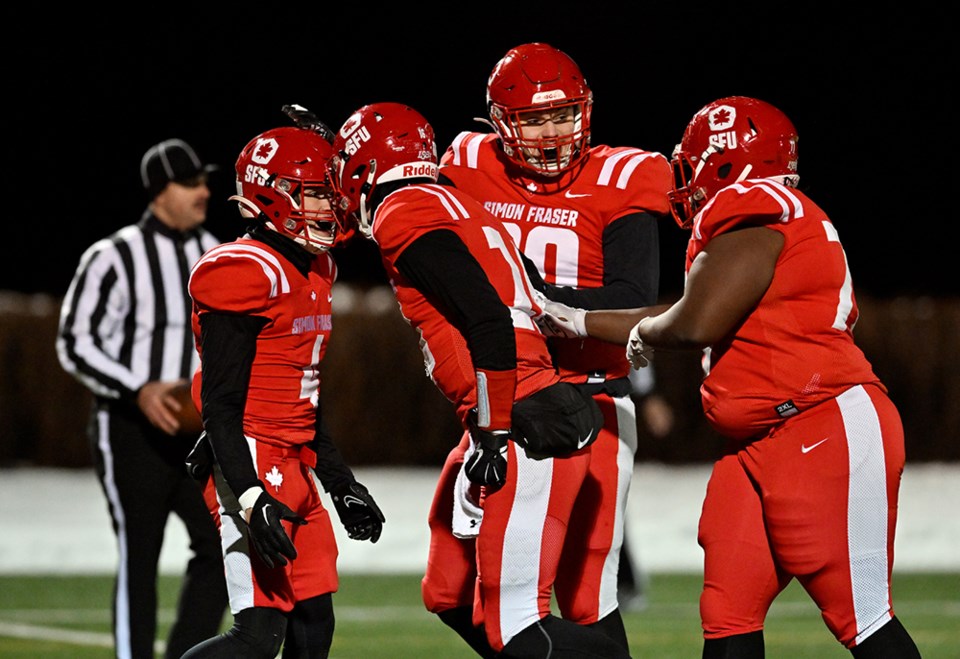One more year on the gridiron, "at least."
That's what a notice of civil claim filed against Simon Fraser University (SFU) is asking for after the sudden cancellation of the Red Leafs football program on April 4.
The claim and application name SFU football players Gideone Kremiler, Kimo Hio, Andrew Lirag, Ryan Barthelson and Dayton Ingenhaag as the plaintiffs.
Among other reliefs, they're seeking interim, interlocutory and permanent injunctions requiring the school to reinstate the football program for at least the 2023 season.
The filing alleges the school broke a contract with the players by scrapping the football program permanently.
"It was a term of this contract that if SFU would not be able to provide a varsity football program for the Plaintiff Players to play, SFU would give reasonable notice to the Plaintiff Players," the claim states.
"SFU did not inform the Plaintiff Players that there was any risk, possibility, or likelihood that SFU would terminate its football program, without reasonable notice, thereby leaving them without the opportunity to play college football at SFU, or at all."
Relief being sought, according to the claim, also includes:
- An order requiring SFU to specifically perform the contract, for at least the 2023 year
- Damages against SFU for breach of contract, including breach of its duty of good faith in the performance of the contract
- Damages against SFU for the tort of negligent misrepresentation
- Interest pursuant to the Court Order Interest Act
- Such other relief as the court determines is just and appropriate
SFU has yet to respond to the alleged claims, as of this publication (April 13).
"It [the injunction] essentially helps with the accountability of the university," SFU Football Alumni Society president Mark Bailey told the NOW during an April 12 interview.
"The university right now, in my opinion, has jeopardized these young people's future," Bailey continued.
"If this was where they were headed with this [cancelling the program], even if it was without consultation, it could have been made in December and given them the full opportunity to at least find other places. It's four months until summer camp. A lot of these student-athletes may not have their areas offered at other institutions nor do they have the means to move elsewhere. So it’s completely disruptive for many different scenarios and to all athletes involved. It wasn’t done in a timely manner."
In an interview a day after the cancellation of the program was announced, SFU athletic director Theresa Hanson told the NOW that the school explored "all avenues" to keep the program going.
Hanson said SFU's athletics department started exploring other avenues once it was determined the conference renewal agreement was not going to be approved after the 2024 season.
"The landscape for Div. II football has significantly changed since we joined the NCAA," she explained.
"And in recent years, there's been a number of Div. II football schools that have discontinued their programs across our conference that we played in [Great Northwest Athletic Conference] and across Div. II. In January of this year, the Lone Star Conference council presidents had voted not to renew Simon Fraser in another two-year affiliate agreement. So, it was, at that time, with that announcement, we found that we have no place to play as of 2024.
"We had stated that 'OK, we need to do a lot of research, we need to look at what options are available to us.'"
Hanson said they talked to the NCAA, NAIA and U SPORTS — Canada's highest level of university sport.
"Within the NCAA, there was no opportunity to join another conference. And to be an independent Div. II football school is not a sustainable option for us short or long-term because we'd have a very tough time getting games. It would be very tough to actually meet our requirements for the NCAA."
She says they pursued discussions with U SPORTS, but they knew that, as a Div. II NCAA school, they didn't meet the existing bylaws for membership within the organization.
"Pursuing an exemption for football only would be very complex, it's unprecedented," Hanson said.
"There's no path for that and it would cause more uncertainty for our athletes with something that has absolutely no assurance that it would happen.
"There's no single football school that plays in an association when their entire athletic program is in a different association. So it makes it a very unprecedented, complex situation with absolutely no assurance. So with all of that information, the university carefully considered everything and made the determination at that time that football was no longer a viable sport for SFU."





.jpg;w=120;h=80;mode=crop)
